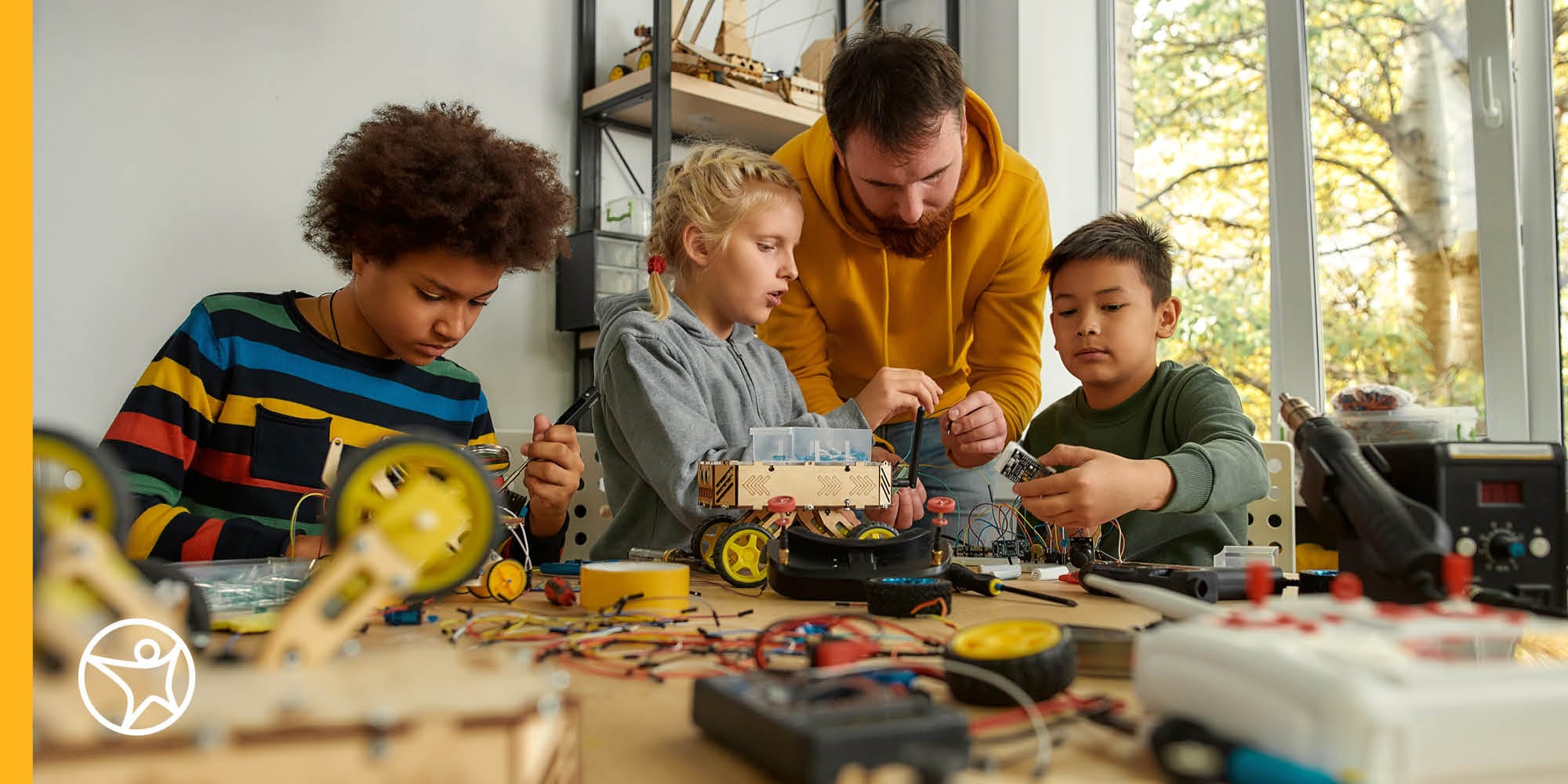Setting Healthy Screen Time Limits for Students Learning Online
byJulie Hersum
5 min to read
This article was originally published September 2022 and has been updated.
Families considering virtual school for their children often are concerned that an online education also means more screen time for their kids than may be healthy.
While technology is essential for virtual school, research has shown that not all screen time is equal. The difference comes down to understanding screen time and productivity.
Negative Effects of Screen Time for Teens
Many researchers are concerned about children’s screen time. It is one issue under review by an ongoing National Institutes of Health study that is tracking brain development in more than 11,500 children recruited at ages 9–10 in 2015. The American Academy of Child and Adolescent Psychiatry’s fact sheet about screen time and children includes warnings about problems with too much screen time.
These organizations and others say children exposed to too much screen time may exhibit:
- Worse mental health (e.g., depression, anxiety)
- Increased behavioral problems
- Decreased academic performance
- Poorer sleep
- Weight problems
- Mood problems
- Eye strain and vision loss
- Poor self-image and body image issues
- Fear of missing out
- Less time reading books
- Less time with family and friends
- Too little outdoor or physical activity
- Less time learning other ways to relax and have fun
Despite the drawbacks, the fact that screens are part of our children’s everyday lives cannot be dismissed. And that’s not always a bad thing. Researchers say the positive aspects of children’s facility with personal electronic devices and the unavoidable screen time required include:
- Heightened quality of socialization and peer relationships (communication tools, multi-player video games)
- Improved motor skills and coordination (video games)
- Improved attitudes toward learning (educational apps and information online)
A primary “pro” for kids’ use of computer and tablet screens is the ease of doing homework and research for school assignments, as well as attending a virtual school online.

What Is a Healthy Time Limit for Teens Online?
There's no one-size-fits-all number when it comes to setting a healthy time limit for screen time for teenagers. Unlike preschool children whose developing brains can be more significantly impacted by the quick movements and bright colors that digital screens can provide, adolescent brains are less impacted by the screen itself and more by what the screen is showing them.
Instead of cutting screen time entirely, recent studies recommend families first make the distinction between the productive and unproductive ways students could use their devices.
Productive vs. Unproductive Screen Time
Screen Time Recommendations for Children
Productive screen time includes anything that supports learning, skill development, and academic progress, such as reading ebooks, playing games to learn a new language, writing or drawing, and even watching TV or movies occasionally. Whatever it is, screen time becomes productive when it is done with intention.
When screen time is purposeful and well-managed, kids can experience:
- Better focus and academic performance
- Improved mental health
- Stronger self-regulation and time management skills
What Is Unproductive Screen Time for Teens?
Unproductive screen time refers to activities that people typically associate with screen time in general, including mindless scrolling through social media or playing non-educational games for hours.
While not necessarily bad if it is used in moderation, unproductive screen time can still become something families should keep an eye on. when it starts interrupting other activities like sleep, homework, or chores. Understanding the distinction between unproductive and productive screen time can help parents and Learning Coaches not only guide their students on making healthier digital choices but also gain a better understanding of how screen time impacts students enrolled in an online school program.
How to Limit Screen Time for Teens
Experts, including the Child Mind Institute, agree: Eliminating screens altogether shouldn’t be the goal. Instead, encourage your child to make intentional choices and build a healthy balance of online and offline activities into their schedule.
Above all, says Psychology Today, “Emphasize the importance of moderation and self-care in all aspects of life.”
So, if you commit to about one fifth of your child’s day to time spent in front of a computer screen during their school years, how much should screen time be limited for the rest of their day?
Practical Tips for Setting Healthy Screen Time Boundaries
- Make a family screen time plan together. Include rules for both school and free time.
- Relate screen time and productivity. Prioritize quality content over time and pay attention to what your child is doing online—not just how long they’re doing it.
- Take movement and eye breaks. Encourage stretch sessions and outdoor play between lessons. For every 20 minutes of screen time, plan for a 20-second break to look away from the screen in order to prevent eyestrain.
- Create screen-free zones and times. Meals, bedrooms, and the hour before bed are great times to start a screen-free habit.
- Teach self-regulation. Teens who are guided but allowed to self-manage their time learn to self-regulate their screen time and often transition better to adulthood.
How Much Screen Time Do Students Really Get in Online School?
At Connections Academy®—a tuition-free online public school—screen time is designed with students' developmental needs in mind. On average,high schoolers can spend 80–90% of their designated learning time on screens, depending on coursework and whether textbooks are digital or print-based.
Alyssa, who has one son who has been enrolled in Ohio Connections Academy® for eight years, says her student spends roughly 2.5 to 3.5 hours online each school day, completing various lesson activities, quizzes, tests, and attending LiveLessons.
“While that might seem like a lot of screen time, it isn’t mindless scrolling through the deep-sea Internet while staring at the computer,” she says.
Above all, says Psychology Today, “Emphasize the importance of moderation and self-care in all aspects of life.”
So, if you commit to about one fifth of your child’s day to time spent in front of a computer screen during their school years, how much should screen time be limited for the rest of their day?
Supporting Healthy Tech Habits with Online School
A core value at Connections Academy® is teaching independence and responsibility—both academically and personally. Families are encouraged to model healthy screen behavior .
Whether your teen is enrolled in a brick-and-mortar school or is learning from home, creating a healthy relationship with technology starts with understanding the “why” behind screen limits, emphasizing screen time and productivity, self-care, and involving your student in setting their own screen-time limits.
Learn more about online school by requesting information about Connections Academy® through our free eGuide.



